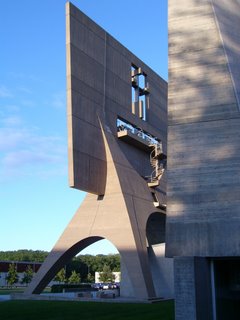A Strange Juxtaposition on 9/11
 As I walked up the hill through the mist for this morning's prayers, I heard the distinct call of a military cadence. Following the sound, I found myself perched at the top of the Clemens football stadium looking down on a group of ROTC men and women rounding the track to the tune of a sing-song cadence. They were young and seemingly full of vigor, even at such an early hour.
As I walked up the hill through the mist for this morning's prayers, I heard the distinct call of a military cadence. Following the sound, I found myself perched at the top of the Clemens football stadium looking down on a group of ROTC men and women rounding the track to the tune of a sing-song cadence. They were young and seemingly full of vigor, even at such an early hour.As we made our way through Morning Prayer, Abbot John perched unusually on his throne, we paused to welcome into the community two new novices--Nicholas and Daniel. They stood before the Abbot and expressed their desire to join the community, despite the Abbot's warning that there would be no easy admittance. Given their new black habits, they carefully shed their suit coats and were assisted in putting on the scapula and hoods.
On this fifth anniversary of the horrific destruction and loss of life in New York, Washington, D. C., and Shanksville, PA, it was clear to me that youthful idealism is still alive. Some have chosen to respond through military service--placing their very bodies on the front lines for the "cause." But the two novices are no less engaged in responding to the fragmentation of life all around them. Many in our American culture would view what they are doing as a withdrawal from reality. But, they have chosen to engage in Benedict's call to "ora et labora" (prayer and work). As I read Benedict's rule this morning, in the Preface it is clear that the primary calling is to prayer. Why do we view this act as somehow withdrawing from the world and not actively engaging it?
I hope somehow that, despite all of the pain associated with this day, we can see it as an opportunity to engage in dialogue with those different from us and begin to pray for one another. While the way of military engagement has a long and noble tradition, the way of St. Benedict is no less historic and grounded in a sense of grappling with the realities of life. Making this clear to my students is at the heart of my own convictions about the arena of worship. As we come together around the throne of grace, what we do has implications for the present, as well as being rooted in the eschatalogical future. So, back to the work of prayer.


<< Home